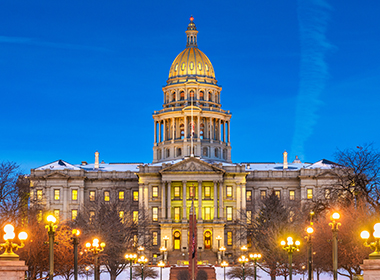
Capitol Connection – April 10, 2020
A Hopeful Message from CAR CEO, Tyrone Adams
COVID-19 has made all of us do and try some things that maybe we wouldn’t do otherwise. For me, it is trying new things while working remotely to prevent myself from sitting in one spot all day and falling victim to mindless snacking! I started practicing juggling when I take breaks. Now I didn’t say I was good at it! If my walls and floors could talk, they would say Amen to that! But oddly enough this is something I find challenging and therapeutic. Maybe it’s fitting because as REALTORS® and association professionals we tend to juggle more than one thing at a time!
We want to thank all of our volunteers for helping us keep the balls in the air while you run your own business! CAR is definitely better because of your service!
Happy juggling!

Tyrone Adams
CEO, Colorado Association of REALTORS®
Breaking News
Additional Clarity on Real Estate as Essential Business
The Department of Regulatory Agencies (DORA) on Thursday issued updated guidance on practicing real estate during this pandemic. DORA stated that “Real estate appraisals and closings are considered critical services to complete real estate transactions. Further, home inspections and final walkthroughs after a buyer has signed a purchase contract and is therefore a condition precedent to the actual transfer of property, is also considered to be an essential part of the real estate transaction. Elements that are fundamental to the real estate transaction are deemed essential to support market activity. However, showing a property or conducting an open house in-person during the COVID-19 pandemic shall be avoided as it violates the specific mandates of recently issued executive and public health orders.” Read DORA’s full bulletin here.
On Wednesday, CAR worked with partners in the real estate industry to send a stakeholder letter to the Governor’s office respectfully requesting that real estate related services be clarified to include any critical aspect of the real estate transaction such as property inspection, final walkthroughs and showings if they can be done with virtual technology that would not violate the social distancing precautions under the statewide stay-at-home orders.
We want all Colorado REALTORS® to understand that with great power comes great responsibility. And again, this clarification does not reflect “business as usual” for real estate in Colorado. The COVID-19 crisis must be taken extremely seriously and ALL Colorado REALTORS® should take extreme precautions whenever executing any part of their business. Thank you to Governor Polis, AG Weiser, and DORA for working so quickly to ensure that Real Estate transactions can continue to operate with appropriate safety precautions for public health.
Article:Polis administration backs off real estate advisory that could have put Coloradans out on the street (Colorado Politics)
Learn more:CAR’s Legal Bites – “CRITICAL BUSINESS” UPDATE
IRS Extends Critical Tax Deadlines
The IRS issued guidance Thursday evening to grant deadline relief for both 1031 like-kind exchanges and opportunity zone investments that are already underway. Both of these programs are designed to promote economic growth in communities, and NAR made the case that investors in these programs should not be harmed due to the effects of COVID-19.
1031 Like-kind Exchanges — If an investor has taken the first step of a like-kind exchange by selling the old property, and either the 45-day or the 180-day deadline falls between April 1 and July 15, the deadline has been extended to July 15.
Opportunity Zones — If an investor who sold a capital asset planned to roll over the gain into an Opportunity Fund and the 180-day deadline to do so falls between April 1 and July 15, 2020, he or she can make the investment as late as July 15.
| COVID-19 Status Update |
Governor Polis Extends Statewide Stay-at-Home Order Until April 26
This Executive Order requires Coloradans to stay at home until April 26, 2020 due to the presence of COVID-19. Read Executive Order here.
Gov. Polis Extends Emergency Disaster Declaration
The Executive Order extends the disaster emergency declaration for COVID-19 for an additional 30 days through May 11.It also allows Colorado to access additional resources, temporarily waives procurement statutes for purchases related to COVID-19, and authorizes the implementation of the State’s Crisis Standards of Care plan (CSC Plan). Read the Executive Order here.
Governor Polis Extends Deadline for State and State-Administered Local Sales Tax to May 20
The Executive Order extends the April 20, 2020 filing and remittance deadline to May 20, 2020 and directs the Department of Revenue (DOR) to waive penalties and interest that would otherwise accrue during this period. Read Executive Order here
Governor Polis Limits Foreclosures and Asks Landlords and Utilities to Forgive Late Payment Without Penalty
The Executive Order limits evictions and foreclosures in order to help ensure stable housing during the COVID-19 crisis. The Office of Governor Polis released a fact sheet for those concerned about eviction, foreclosure, or disconnection of utility services during this time. Read Executive Order here.
COVID-19 Virtual Panel (April 6)
This past Monday, Scott Peterson, Damian Cox, and Elizabeth Peetz provided a live update on the COVID-19 virus and its implications on real estate transactions, the Colorado legislative session, federal initiatives to support REALTORS®, and the wide variety of risk management considerations that every REALTOR® needs to consider. Watch a recording of the webinar here.
CARES Act and SBA Resources for REALTORS®
The Colorado Department of Labor and Employment is working to administer the new federal CARES Act programs and we recommend you check back regularly for announcements for Independent Contractor applications. Since these are brand new federal programs or expansions of existing programs many states are still in the process of getting ready for new applicants even though the Federal program has opened. For SBA programs EIDL and PPP, start by working with an eligible lender to prepare your application and get in the queue for consideration. For Pandemic Unemployment Assistance, this federal money is administered by the Colorado Department of Labor and Employment itself, so the application process will be announced on their website.
Paycheck Protection Program (PPP) Federal Dates:
April 3: Small businesses and sole proprietors can apply for the loans
April 10: Independent contractors and self-employed individuals eligible to apply
Applications should go directly through an SBA lender.
Click here to use SBA’s tool to find eligible lenders and learn more about qualifications.
Economic Injury Disaster Loans (EIDL) and Grants
Under the CARES Act, an loan of up to $2 million is available to any small business, nonprofit, or business with 500 or fewer employees that experiences an economic hardship as a result of COVID-19. This includes sole proprietors, independent contractors, tribal businesses, and cooperatives. These loans can be used to pay fixed debts, payroll, accounts payable and additional bills that can’t be paid because of COVID-19’s impact. Applicants also have the option to apply for a grant of up to $10,000.
You can find out more about Coronavirus relief options, helpful tips for the application process, and how to find an SBA lender on NAR’s FAQ and by visiting the SBA’s website.
Pandemic Unemployment Assistance (PUA)
A key provision in the CARES Act creates a temporary Pandemic Unemployment Assistance program that extends unemployment benefits to those not traditionally eligible, including self-employed individuals. To be eligible, among other requirements, individuals must demonstrate that they are otherwise able to work and available for work within the meaning of applicable state law, except that they are unemployed, partially unemployed, or unable or unavailable to work because of COVID-19 related reasons. See NAR’s Unemployment Assistance CARES Act FAQs.

| Government Affairs Update |
Colorado Supreme Court Determines 120 Days of Legislative Session Does Not Have to be Consecutive
On April 1, the Colorado Supreme Court issued its opinion on the temporary adjournment of the legislative session, concluding the 120 days of the legislative session do not need to be consecutive days. On a narrow 4-3 vote, the Colorado Supreme Court found the state’s Constitution is ambiguous on the time frame for how the 120 legislative days in the legislative session should be counted, but they also determined that the General Assembly acted in accordance with applicable rules which means the legislature can reconvene to finish out the session at a later date rather than be forced to adjourn on May 6. Finally, the Court ruled that a special session would not be an appropriate alternative since special sessions are not used for general business but instead for a special purpose.
The General Assembly is expected to reconvene around May 18 as we see the impacts of the stay-at-home orders flatten the potential curve of a surge of COVID-19 cases. They will be able to finish out the 52 days left in the 2020 legislative session. And the first order of business will be passing the state budget and School Finance Act, and some of the Sunset legislation that continues regulatory agency programs. Other substantive legislation will most likely be prioritized in terms of cost and immediate need to the State of Colorado.
Bills Signed by Governor Polis This March
HB-1093: County Authority License and Regulate Business (3/23/20) (LPC Position-AMEND) HB 1093 permits counties to license and regulate short-term rentals by extending the same authority that cities already have to counties. CAR worked diligently to narrow the originally broad bill regulating all businesses to restrict regulatory authority to short-term rentals only and further limit the board of county commissioners or assessors from changing the property tax classification that could mean a difference of property tax of 7% or 29%. With these critical amendments the Counties would have the authority to regulate fees or terms and licenses for short term rentals dealing with items such as how to dispose of trash to prevent bear activity rather than reclassifying the property tax rate.
HB-1009: Suppressing Court Records of Eviction (3/20/20) (LPC Position – AMEND) HB-1009 prevents a filing of an eviction from being held against a tenant when there was not a final ruling for eviction from the Court. Amendments clarified that when a tenant and landlord disagree, but there is a court ruling for eviction that the record can be made public. As other stakeholders have suggested, this legislation would prevent a person from being seen to lose a case before their case is finalized.
SB-025:Conservancy District Boards Art and Beautification Projects (3/11/20) (LPC Position – SUPPORT) SB-025 creates the Rural Development Grant Program under the Colorado Office of Economic Development to support early stage businesses and local economic development organizations in rural Colorado. CAR supports innovative programs that open the door for business startups, large scale infrastructure projects, job creation, economic incentive programs, and business relocations and expansions. This legislation has the potential to stimulate private sector investment and address uneven economic recovery or growth in Colorado communities through participation in the federal opportunity zone programs after we get through the COVID-19 environment.
COVID-19 Impacts Efforts to Put Statewide Limited Growth on the November Ballot
Stay-at-home orders and social distancing requirements increase the difficulty for ballot initiatives and candidates to obtain the requisite number of signatures to qualify ahead of the primary and June 5 deadline as the State Constitution determines.
Daniel Hayes, proponent of the ballot measure to limit housing growth in 11 Front Range counties, stated that his effort is “failed” because of the COVID-19 outbreak. Therefore, Hayes announced he will not move forward with the ballot measure this year.
Article: The clock is ticking for citizen ballot measures, but the campaigns are paused due to the coronavirus (Colorado Sun)

Colorado Project Wildfire – Upcoming Taskforce Meeting: April 21
Registration coming soon: Next CPW Taskforce meeting will be held virtually on Tuesday, April 21 at 3:30 p.m.
Developed by the Colorado Association of REALTORS®, Project Wildfire is designed to help reduce the destruction of land, property, and lives. Working in partnership with other like-minded fire prevention organizations across the state, local REALTOR® associations are bringing education and awareness, as well as access to resources, directly to residents in their local communities. To learn more about Colorado Project Wildfire, click here.
Colorado Project Wildfire Partnerships Gaining State and National Attention – Read here.


